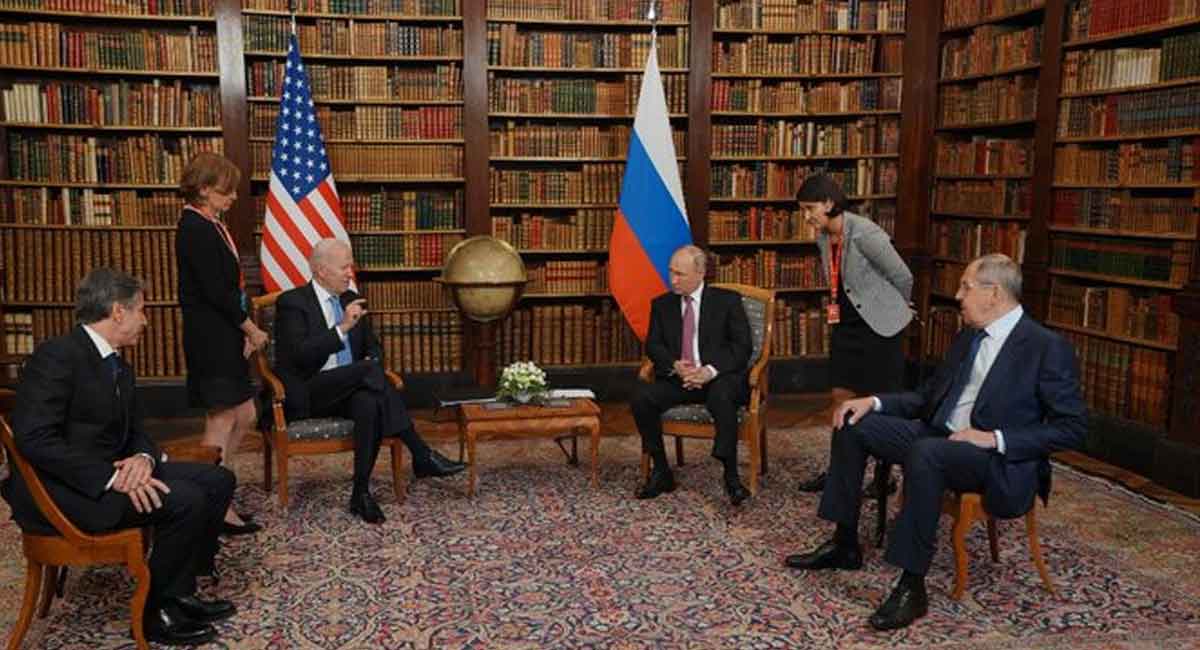US-Russia security talks to begin in Geneva amid tensions
Mon 10 Jan 2022, 12:37:27

Washington: Security talks between the US and Russia in Geneva scheduled for Monday have drawn attention from the international community.
The talks are expected to focus on the North Atlantic Treaty Organization (NATO) and the rising tensions in Ukraine, as well as arms control, cybersecurity and climate change, Xinhua news agency reported.
While calling the dialogue a positive signal to improve frayed US-Russia relations, experts are cautious about its outcomes.
“We have to manage expectations,” Thomas Greminger, director of the Geneva Centre for Security Policy who previously served as secretary general of the Organization for Security and Cooperation in Europe from 2017 to 2020, told Xinhua in a virtual interview.
“It’s obviously great that we will see another round of this Strategic Stability Dialogue on Monday here in Geneva. I think it’s good that they meet and talk, but clearly for the issues on the agenda there are no quick fixes,” he said.
“I would expect the meeting on Monday to be an opportunity to spell out mutual concerns, to spell out mutual expectations,” said Greminger.
Keith Krause, a professor at the Graduate Institute of International and Development Studies in Geneva, told Xinhua: “I’m not very optimistic. I think that it’s more the beginning of a longer-term conversation.
“I know that certainly (US President Joe) Biden attempted to reset the relationship with the Russians last year, and I believe that’s a long and slow process because there are many, many very clear differences between the two. Ukraine being one of them, but there are a number of other issues that are quite conflictual at this point.
“On the nuclear dialogue, perhaps I would be a bit more optimistic that they will begin to have some conversations.”
In a year-end telephone
call between Biden and Russian President Vladimir Putin last month, the two leaders discussed the decision to launch the negotiations under which Russia’s security would be ensured in a bid to prevent a further escalation of tensions.
call between Biden and Russian President Vladimir Putin last month, the two leaders discussed the decision to launch the negotiations under which Russia’s security would be ensured in a bid to prevent a further escalation of tensions.
Biden emphasized that Russia and the US bear a special responsibility for ensuring stability in Europe and the world.
The two permanent members of the UN Security Council have vowed to de-escalate the standoff over Ukraine. Amidst heightening tensions, the Biden administration had previously threatened Russia with fresh, sweeping sanctions.
Russia responded that further large-scale economic sanctions would lead to a severing of relations between Moscow and the West.
On Friday, the Foreign Ministers of NATO member states held an extraordinary virtual meeting to discuss “Russia’s continued military build-up in and around Ukraine” and broader European security issues.
For Ukraine, seeking NATO membership has become one of its foreign policy priorities.
In February 2019, the Ukrainian Parliament adopted amendments to the constitution, securing the country’s aspiration to join the alliance.
“Even without these current tensions and without this meeting about to happen, NATO membership of Ukraine couldn’t be expected any time soon since there is a de facto moratorium on this issue in a few very important Western capitals,” Greminger said.
Krause agreed with Greminger, saying: “I don’t think that Ukraine will join NATO any time soon. I do think that the country itself is in some sense divided.”
Greminger warned that geopolitical tensions between Washington and Moscow are likely to continue this year.
However, at least some common ground for cooperation could be found, the expert added.
No Comments For This Post, Be first to write a Comment.
Most viewed from International
Most viewed from World
AIMIM News
Latest Urdu News
Most Viewed
May 26, 2020
Do you think Canada-India relations will improve under New PM Mark Carney?
Latest Videos View All
Like Us
Home
About Us
Advertise With Us
All Polls
Epaper Archives
Privacy Policy
Contact Us
Download Etemaad App
© 2025 Etemaad Daily News, All Rights Reserved.

.jpg)
.jpg)
.jpg)






.jpg)


.jpg)
.jpg)
.jpg)
.jpg)
.jpg)
.jpg)
.jpg)
.jpg)
.jpg)
.jpg)
.jpg)
.jpg)

















